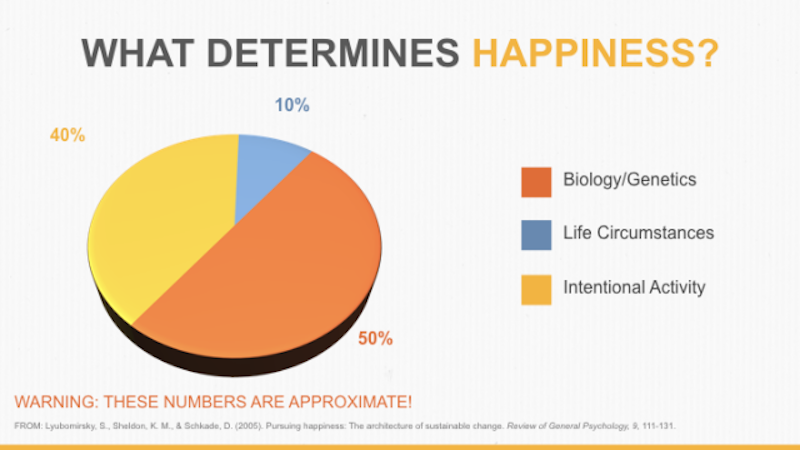The researchers behind the original 'happiness pie chart' share what they've learned in the past 15 years. By Kira M. Newman on behalf of Greater Good Science Center.
Do you know the happiness pie chart? If you’ve read a book or listened to a talk about happiness in the past 15 years, there’s a good chance you heard that 50 per cent of our happiness is determined by our genes, 40 per cent by our activities, and 10 per cent by our life circumstances.
Neat and tidy, the pie chart — originally proposed in a 2005 paper by researchers Sonja Lyubomirsky, Kennon M. Sheldon, and David Schkade — painted a clear picture of what contributes to our well-being. Unfortunately for some of us, the chart suggested, the genes we got from our parents play a big role in how fulfilled we feel. But it also contained good news: by engaging in healthy mental and physical habits, we can still exert a lot of control over our own happiness.
RELATED: Is happiness genetic?
In recent years, critics have raised questions about this simple formula — one that many summaries (including mine above) misreport anyway. And now, a decade and a half after the pie was baked, two of the authors are coming out to say that they agree with many of the criticisms. Even so, they add, their broader message still holds: It’s possible to take deliberate steps to get happier and to stay happier in life.
The proof in the pie
“When you are given a graph that is this clean, it seems reasonable to be skeptical,” warns George Mason University professor Todd Kashdan in his blog post critiquing the pie chart. While the pie has separate slices, he argues, our genes, our life circumstances, and our activities aren’t three isolated factors that influence our happiness directly. They can also influence each other, muddying those distinctions.

The original happiness pie chart
For example, Kashdan writes, you may have a gene for leadership, but you won’t necessarily turn into an adept leader unless you find yourself in the right life circumstances (for starters, a supportive social environment). Or, as the University of Groningen’s Nicholas Brown and the University of Leipzig’s Julia M. Rohrer write in their 2019 paper, perhaps you have a genetic disposition toward anxiety — activated by the circumstances of your stressful childhood — that is putting a damper on your happiness.
As these examples illustrate, and new studies are showing, genes may be expressed or not depending on what happens in our lives (both what happens to us — our circumstances — and what we choose to do — our intentional activities). In the other direction, genes can influence our tendency to engage in activities that will make us happier, such as exercise, acts of kindness, or pursuing goals.
RELATED: The power of kindness
Even assuming these three factors could be totally separated, critics argue that the 50 per cent for genes and 10 per cent for life circumstances are underestimates — making the 40 per cent figure too high. For example, Brown and Rohrer cite recent research suggesting that the heritability of happiness is 70 to 80 per cent.
The 10 per cent figure was based on studies mainly measuring demographics — like age, income, education, race, and sex, they point out. But the term “life circumstances” is extremely broad and includes (as Lyubomirsky and her colleagues noted in 2005) “the national, geographical, and cultural region in which a person resides.” But studies done in a single country probably won’t capture the widest possible variation in life circumstances like these, which may explain why the 10 percent slice is too small.
“Happiness can be successfully pursued, but it is not easy.” Sonja Lyubomirsky and Kennon M. Sheldon
Finally, even assuming the 50/40/10 was right, there is that crucial misunderstanding that countless speakers and publications have perpetuated: these numbers don’t represent how much of our individual happiness comes from various sources, but how much of the differences among people (in general) do. If your happiness is 8/10, you can’t say that 3.2 points of that is determined by your activities; you can merely say that just under half of the average gaps between your happiness and other people’s comes down to what activities everyone is doing.
Put that way, not only is the conclusion less catchy, but the control we have over our own well-being seems much less significant.
Happiness science today
In their updated paper about the pie chart, Sheldon and Lyubomirsky acknowledge that they largely agree with these criticisms. The numbers were intended to be estimates in a thought experiment, says Lyubomirsky, adding that their original paper should have clarified how our genes, circumstances, and activities can influence and interact with each other.
“Our aim [more than 18 years ago] was more to pose a question — is it possible for happiness to go up — and to stay up? — than to provide an answer,” says Lyubomirsky. “Like all pie charts, ours was a gross oversimplification.”
What determines happiness? Unsplash/Fernando Brasil
She and Sheldon also admit that activities may influence happiness less than they thought, contributing as little as 15 per cent of the differences in one study. On one hand, that might seem like bad news for those of us who devote substantial time and effort to our own self-improvement. On the other hand, it just confirms what we probably know already: “Happiness can be successfully pursued, but it is not ‘easy,’” they write. In other words, happiness for many people will simply be something that is hard won. For others, happiness may feel like a natural state.
Debates aside, it’s clear that the optimistic message of the pie chart did inspire groundbreaking research over the last 15 years into positive psychology. We’ve learned that the behaviors and habits we engage in do matter — from gratitude to kindness to mindfulness — and that they can lead to an enduring happiness boost. And thanks to that research, we also have an understanding of what we can do to give ourselves the best chance of success:
-
Choose activities that fit our personality and interests. Activities fit us better when they feel natural, enjoyable, and aligned with our values, rather than driven by guilt or other people’s expectations.
-
Choose activities that are virtuous and meaningful, rather than obsessing about feeling good all the time. Hedonism won’t necessarily make you happy, even if you feel good in the moment. If we pursue pleasure, it shouldn’t be at the expense of living a meaningful life. We also need to pursue a purpose, and practice forgiveness, gratitude, and generosity — those give us a sense of competence, autonomy, and connection, which are core human needs.
-
Commit to and put effort into the process. Unsurprisingly, people who invest more effort into their new habits see greater improvements in their well-being.
- Add variety into our routine. Doing an exercise — like writing gratitude letters — the same way over and over can mean that we become accustomed to it and don’t reap as many benefits. You have to keep your brain alive to possibilities.
“People can create for themselves a steady inflow of engaging, satisfying, connecting, and uplifting positive experiences, thereby increasing the likelihood that they remain in the upper range of their happiness potentials,” Sheldon and Lyubomirsky write.
At the end of the day, it’s impossible to predict how much happiness you’ll get from any specific change you make in life. We’re all individuals, and no pie chart can tell us that. What it can tell us, though, is that it’s worth it to try. ●
Main image: shutterstock/Mavo
 This article originally appeared on Greater Good, the online magazine of the Greater Good Science Center at UC Berkeley. happiness.com is grateful to republish it with the kind permission of the Greater Good Science Center. greatergood.berkeley.edu
This article originally appeared on Greater Good, the online magazine of the Greater Good Science Center at UC Berkeley. happiness.com is grateful to republish it with the kind permission of the Greater Good Science Center. greatergood.berkeley.edu




Join the conversation
You are posting as a guest. If you have an account, sign in now to post with your account.